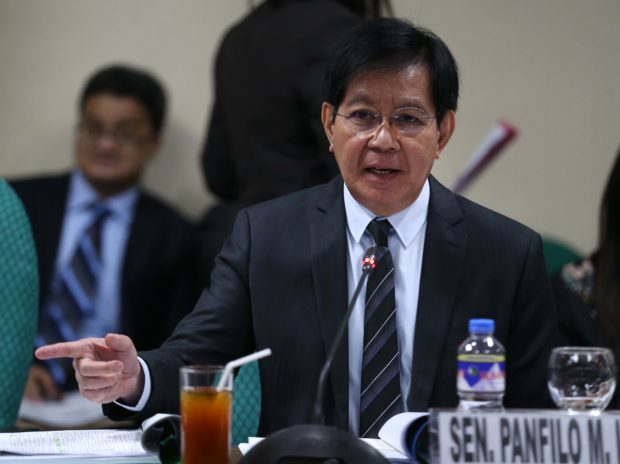Lacson warns of revolution if prices are not checked
“When the stomach protests, prepare for revolution.”
Sen. Panfilo Lacson issued this warning on Sunday, urging the government to do something to arrest price increases being blamed on the Tax Reform for Acceleration and Inclusion (TRAIN) Act.
“This is the experience not only in our country but in countries in Latin America,” Lacson said in an interview with radio station dzBB.
In the House of Representatives, the chair of the powerful ways and means committee expressed willingness to discuss proposals to suspend the collection of additional excise on fuel, but not the enforcement of the entire TRAIN law.
“What we do not want is to hastily stop the TRAIN law,” Quirino Rep. Dakila Carlo Cua said in an interview, also with dzBB.
Different story
Lacson said it was a different story when the people’s stomachs began complaining. “Let us not wait for things to go badly.”
He urged the government to do something to arrest the rise in prices of almost everything.
The senator said that while he was not encouraging protests, “it’s a fact of life.”
Lacson said he had predicted the inflationary effect of the TRAIN law in the course of opposing the measure. The tax law was passed last year and took effect on Jan. 1.
“I don’t regret voting against the measure,” he said in a tweet.
Advice to DOF
He recalled that he advised the Department of Finance (DOF) last year against raising the excise on fuel and instead review 143 exemptions to the 12-percent value-added tax (VAT).
He said Malaysia’s 6-percent VAT had only 14 exemptions and Thailand’s 7-percent VAT had only 25 exemptions.
Lacson said eliminating many of the VAT exemptions could have generated an additional revenue of P117.5 billion a year.
He said his proposals “would hit ecozones, power, housing, cooperatives and other industries.”
“As you know, some of my colleagues had stakes in the industries that would be affected,” he said.
VAT exemptions
Lacson repeated his proposal to remove several VAT exemptions and said he would consult with finance officials for a bill with that objective.
On suspending the collection of increased excise on fuel, the senator said the problem would be how to fill the revenue gap that such a move would create.
“The problem there is revenue erosion,” he said. “Where will you find the revenue to compensate for it? We need to study it so it is holistic.”
“It is easy to call for the suspension of excise on fuel. That is not only popular, it’s an easy solution, but how will you fill the shortfall?” he said.
Cua said stopping the whole TRAIN law would not be beneficial to the people.
Excise on fuel
But he added that it should be proven first that additional excise on fuel really caused a “huge pressure for prices to increase.”
Cua echoed the government economic managers’ claim that only 0.4 percent of the 4.5-percent inflation rate in April was due to the TRAIN law’s effects.
He said “the government would lose double” if the reduction of income taxes continued but the collection of increased excise on fuel and other goods stopped.
The TRAIN law, which overhauled the income tax regime and increased the ceiling for tax-exempt salaries, imposed a new P3 tax for every liter of kerosene, P2.50 for every liter of diesel and bunker fuel, and P1 for every kilogram of liquefied petroleum gas (LPG).
Tax rates on kerosene, diesel, bunker fuel and LPG would be further adjusted to P4, P4.50 and P2 in 2019 and P5, P6 and P3 in 2020.
The TRAIN law also imposed tax rates of P7 per liter of unleaded premium gasoline, naphtha, regular gasoline and pyrolysis gasoline.
The effects of the TRAIN law on consumer prices coincided with the steady increase of crude oil prices in the world market.
In a separate statement, Magdalo Rep. Gary Alejano reiterated his call for an urgent review of the TRAIN law and the suspension of the excise collection “if necessary.”
Alejano noted that there had been forewarnings about the TRAIN law’s negative impact on the poor but these were brushed aside due to assurances that the poorest families would be given unconditional cash transfers of P2,400 each for the entire year.
“However, we are seeing that safety nets are still promises while the poor are being [battered] by high prices of commodities,” he said. —Reports from DJ Yap and Vince F. Nonato
